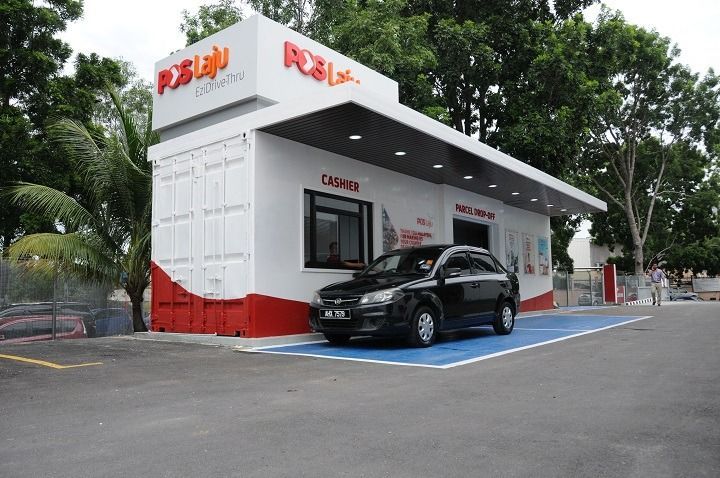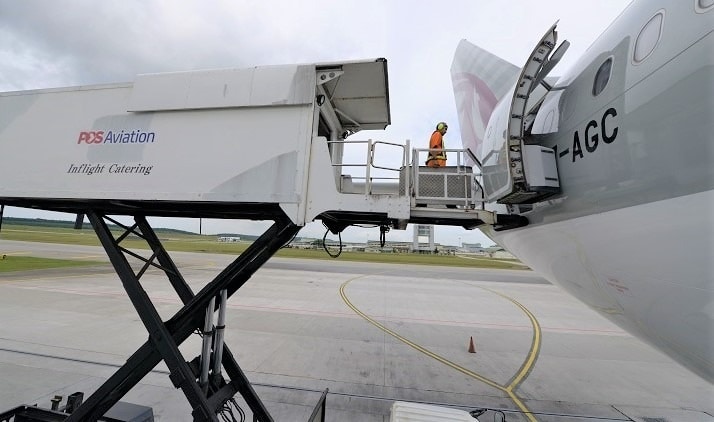
Pos Malaysia Group (“the Group”) started as a traditional postal service and has since expanded to provide financial services and supply chain solutions. As reinvention became necessary, Pos Malaysia embarked on a digital transformation plan to redefine its business model.
“The rapid adoption of technology has brought about new challenges to our business. Pos Malaysia knew it must adapt to digitalisation to remain relevant in the industry and to support the changing trend in customer behaviour, from physically going to retail stores to buying goods online,” said Group Chief Executive Officer, Syed Md Najib.

When faced with digital disruption, Pos Malaysia encountered difficulties due to its outdated systems, traditional business model, and a weakening outlook for selected business segments. Legacy systems posed a challenge for the Group when competing with digital-native entrants. Amidst this environment, the company has engaged in notable initiatives to provide consumers with fast and secure delivery, as well as a seamless customer experience. This transformation is crucial for the company to build a sustainable business, one that is relevant in the digital era.
In 2019, Pos Malaysia committed to a new mission – to build a truly customer-centric organisation. The Group set out a three-year modernisation and transformation plan to remain relevant, competitive and profitable.
A major transformation area was in the digitalisation of customer-facing functions. Recognising the growth of the digitally-driven consumer, Pos Malaysia revamped its website and enhanced its mobile application to improve customer experience. With over 1.3 million downloads of the mobile app, there was an average of 200,000 monthly users with app-related transactions from January to July 2020.
Handwritten consignment notes have been replaced by the e-consignment note which can be generated via the website or the mobile app. Customers can print the e-consignment note at Pos Laju outlets, kiosks and selected Pos Laju EziDrive-Thru. As of September 2020, there have been 1.5 million e-consignment notes generated - thus reducing errors and enhancing efficiency.

Pos Malaysia’s customers can track their parcel via the Track and Trace system that is available on Pos Malaysia’s website and mobile app. The system allows customers to monitor their parcels via the tracking number or by scanning the bar code.
Pos Laju SendParcel, an online shipping platform, is also integrated into the mobile app and allows customers to post their parcels without having to leave their home or office. Customers only need to schedule for pick-up at their own convenience and Pos Laju will come to collect the parcels. The platform has expanded its service by offering international deliveries to over 200 countries, connecting local SMEs and e-commerce businesses to the overseas market. As at the end of January 2021, over 7 million parcels have been shipped via SendParcel.
Additionally, the implementation of the AskPos chatbot and live chat channels gives customers a self-service option to resolve simple issues. Customers are met through real-time conversations and can obtain personalised help online. Since its inception, over 2.9 million conversations were initiated on AskPos, or about 40,000 to 60,000 customer conversations per week – reducing contact centre operation costs.
E-insurance service is Pos Malaysia’s most recent initiative in providing its customers a better service experience. With e-insurance, motor vehicle insurance renewal is made easy, convenient, and available at any time. Pos Malaysia is planning to add more insurance providers and more insurance products soon, to offer its customers multiple options to suit their requirements.
Moving forward, customers can look forward to more services in Pos Malaysia mobile app which include financing, wasiat, will, remittance and others.
While the implementation of e-consignment notes has improved customer experience by reducing over-the-counter wait times and human errors, the self-service parcel lockers (i.e Pos Laju EziBox) has been added to give convenience for customers to collect and drop-off Pos Laju items at their own time.
Pos Malaysia’s customers also have an option to pay their utility bills via the Pos Automated Machines that is available at selected post office. Launched last year, customers can pay their utility bills via cashless methods, at their own convenience and reduces over-the-counter congestion.
Pos Malaysia is also giving solutions to their business customers through Pos Digicert, a subsidiary which is responsible for the creation of digital identities through the use of digital certificates. The Pos Digicert Digital Signing feature is another solution that incorporates digital signatures for the company’s BizClient Ivest server and digital certification services. The option safeguards organisations from data fraud, data tempering, and authenticates documents simultaneously, thus enhancing the trustworthiness of the documents in hand. Organisations can now move from a physical certification environment to one that is digital, validated and secure.
As part of Pos Malaysia’s transition into entering Industrial Revolution 4.0 (IR4.0), the company integrated Robotic Process Automation (RPA) into existing Standard Operating Procedures (SOP) for both front-end and back-end processes of our cargo operations at the Kuala Lumpur International Airport (KLIA).
Pos Aviation, a subsidiary of Pos Malaysia that handles in-flight catering and cargo has implemented Robotic Process Automation (RPA) to assist the cargo handling operations team. These robots act as a digital workforce to streamline operations and expedite key business activities thus ensuring efficiency. The human workforce can focus on more valuable work as the system automates repetitive mundane task and increase productivity that are compounded across thousands of transactions.

Pos Malaysia is also improving its procurement process efficiency as it switches from manual processing to an online procurement system. The end-to-end procurement system, from purchase requests, orders to payments, have benefited from the upgrade. Advantages include an overview of the entire process, reduced leakages, improved documentation storage and better budget monitoring.
The benchmark for successful digital transformation lies in the ability to provide swift and reliable service. Digital native entrants, in particular, could press on these attributes with its integrated and flexible platforms compared to larger organisations with multiple, siloed systems. As such, Pos Malaysia had a daunting task in hand – to transform its IT infrastructure and mitigate the disadvantages.
Pos Malaysia integrated cloud CDNs (Content Delivery Networks) to provide swifter service delivery for its websites and applications. These technologies reduce information travel distance and server workloads, resulting in lower latency and faster content delivery. The existing Wide Area Network (WAN) services also support cloud CDNs, providing added protection in the information transformation process.
Moreover, to ensure stability and scalability of its software solutions, the Group has introduced Performance Testing Services in 2019. This step helps Pos Malaysia evaluate its system’s performance under normal and anticipated peak conditions. Consequently, it ensures that end-users do not encounter any performance issues when using the applications. Pos Malaysia customers can now enjoy fast, stable, and secure experiences on digital platforms.
Creating a secure infrastructure enforces digital trust in customers, especially when it concerns sensitive personal customer information. A malware attack in 2019 made the Group take a proactive stance in cybersecurity defence. Pos Malaysia has complemented its cloud adoption with intelligent threat detection systems. These systems safeguard end-users and networks from malware and confidential data breach attacks. The digital transformation plan remains secure due to this vital step, and the company now boasts zero complaints from data breaches.
Pos Malaysia continues to ensure that it is capable to handle the surge in demand driven by e-commerce growth. As such, the Group continues its pursuit in optimising operational efficiency. With parcel volume reaching 800,000 a day during peak seasons, Pos Malaysia commits to leverage on automation for its distribution and fulfilment centres.
To date, Pos Malaysia has equipped 35 distribution centres with semi-automated sorting systems. These upgrades were crucial in easing the strain on manpower, resulting in greater capabilities and lowered costs. The improved sorting systems were especially beneficial during peak seasons, where deliveries can go up to over 8 million parcels per month, as experienced in the 11.11 online mega-sale. As such, the Group plans to continue this initiative by deploying semi-automated systems across 20 distribution centres this year.
To further supplement the vision of an ideal processing capacity, the Group is also investing in fully-automated and integrated fulfilment centres. Pos Malaysia aims to launch its first regional Mini-Integrated Parcel Centre (IPC) in Senai, Johor, to cater for volume growth, with a target to process a total of 1 million parcels daily.
To remain competitive in the industry, Pos Malaysia forged strategic partnerships to diversify its revenue stream. The Group’s most recent partnership with Allianz Life Insurance aims to improve life insurance accessibility for all Malaysians. Together, they have launched PosLifeCare, an affordable life insurance plan with a premium from as low as RM0.14 a day.
The Group formed a partnership with CollectCo, a leading parcel delivery and collection network. Through this collaboration, Pos Malaysia secured an additional 1,255 partner outlets. The Group was able to expand its customer reach while achieving financial sustainability through agent and partner-operated outlets.
The main focus for Pos Malaysia at this juncture is to win market share in the fast-growing e-commerce driven courier delivery segment. The investments made by the Group in technology augurs well for the future. Pos Malaysia is well-placed to address the shift in consumer demand for digital services.